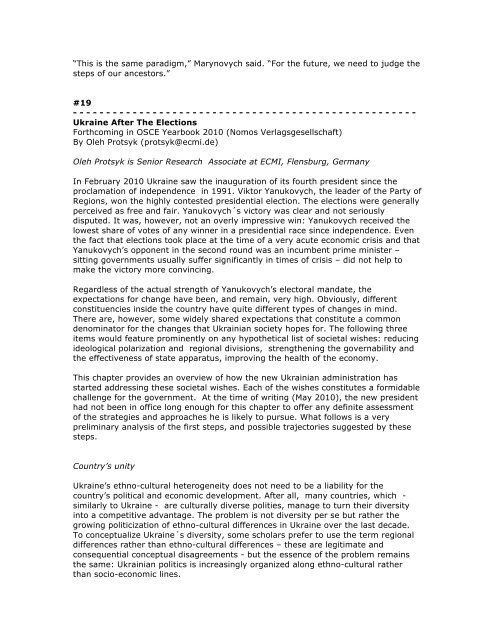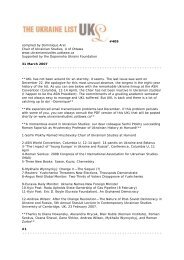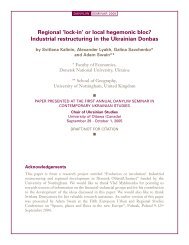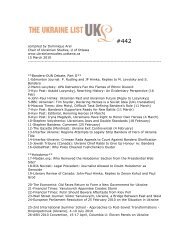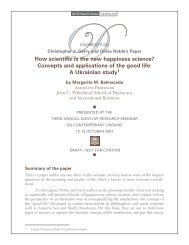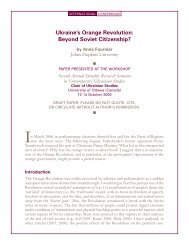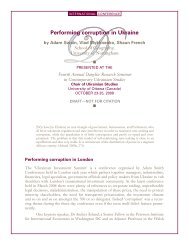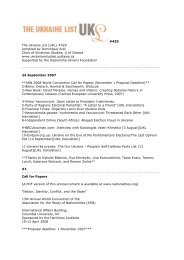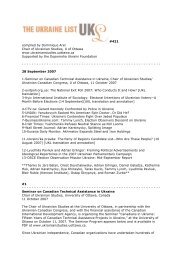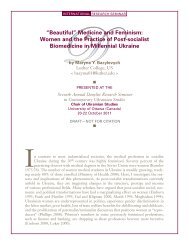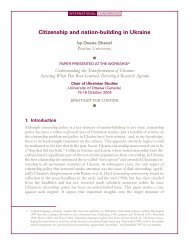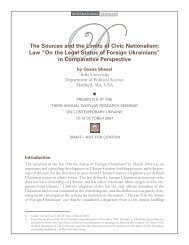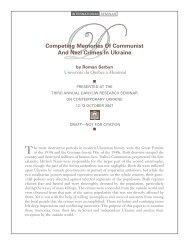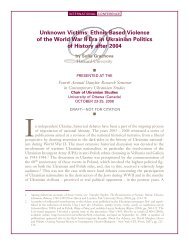UKL444 - Chair of Ukrainian Studies
UKL444 - Chair of Ukrainian Studies
UKL444 - Chair of Ukrainian Studies
Create successful ePaper yourself
Turn your PDF publications into a flip-book with our unique Google optimized e-Paper software.
“This is the same paradigm,” Marynovych said. “For the future, we need to judge the<br />
steps <strong>of</strong> our ancestors.”<br />
#19<br />
- - - - - - - - - - - - - - - - - - - - - - - - - - - - - - - - - - - - - - - - - - - - - - - - - - - -<br />
Ukraine After The Elections<br />
Forthcoming in OSCE Yearbook 2010 (Nomos Verlagsgesellschaft)<br />
By Oleh Protsyk (protsyk@ecmi.de)<br />
Oleh Protsyk is Senior Research Associate at ECMI, Flensburg, Germany<br />
In February 2010 Ukraine saw the inauguration <strong>of</strong> its fourth president since the<br />
proclamation <strong>of</strong> independence in 1991. Viktor Yanukovych, the leader <strong>of</strong> the Party <strong>of</strong><br />
Regions, won the highly contested presidential election. The elections were generally<br />
perceived as free and fair. Yanukovych´s victory was clear and not seriously<br />
disputed. It was, however, not an overly impressive win: Yanukovych received the<br />
lowest share <strong>of</strong> votes <strong>of</strong> any winner in a presidential race since independence. Even<br />
the fact that elections took place at the time <strong>of</strong> a very acute economic crisis and that<br />
Yanukovych’s opponent in the second round was an incumbent prime minister –<br />
sitting governments usually suffer significantly in times <strong>of</strong> crisis – did not help to<br />
make the victory more convincing.<br />
Regardless <strong>of</strong> the actual strength <strong>of</strong> Yanukovych’s electoral mandate, the<br />
expectations for change have been, and remain, very high. Obviously, different<br />
constituencies inside the country have quite different types <strong>of</strong> changes in mind.<br />
There are, however, some widely shared expectations that constitute a common<br />
denominator for the changes that <strong>Ukrainian</strong> society hopes for. The following three<br />
items would feature prominently on any hypothetical list <strong>of</strong> societal wishes: reducing<br />
ideological polarization and regional divisions, strengthening the governability and<br />
the effectiveness <strong>of</strong> state apparatus, improving the health <strong>of</strong> the economy.<br />
This chapter provides an overview <strong>of</strong> how the new <strong>Ukrainian</strong> administration has<br />
started addressing these societal wishes. Each <strong>of</strong> the wishes constitutes a formidable<br />
challenge for the government. At the time <strong>of</strong> writing (May 2010), the new president<br />
had not been in <strong>of</strong>fice long enough for this chapter to <strong>of</strong>fer any definite assessment<br />
<strong>of</strong> the strategies and approaches he is likely to pursue. What follows is a very<br />
preliminary analysis <strong>of</strong> the first steps, and possible trajectories suggested by these<br />
steps.<br />
Country’s unity<br />
Ukraine’s ethno-cultural heterogeneity does not need to be a liability for the<br />
country’s political and economic development. After all, many countries, which -<br />
similarly to Ukraine - are culturally diverse polities, manage to turn their diversity<br />
into a competitive advantage. The problem is not diversity per se but rather the<br />
growing politicization <strong>of</strong> ethno-cultural differences in Ukraine over the last decade.<br />
To conceptualize Ukraine´s diversity, some scholars prefer to use the term regional<br />
differences rather than ethno-cultural differences – these are legitimate and<br />
consequential conceptual disagreements - but the essence <strong>of</strong> the problem remains<br />
the same: <strong>Ukrainian</strong> politics is increasingly organized along ethno-cultural rather<br />
than socio-economic lines.


